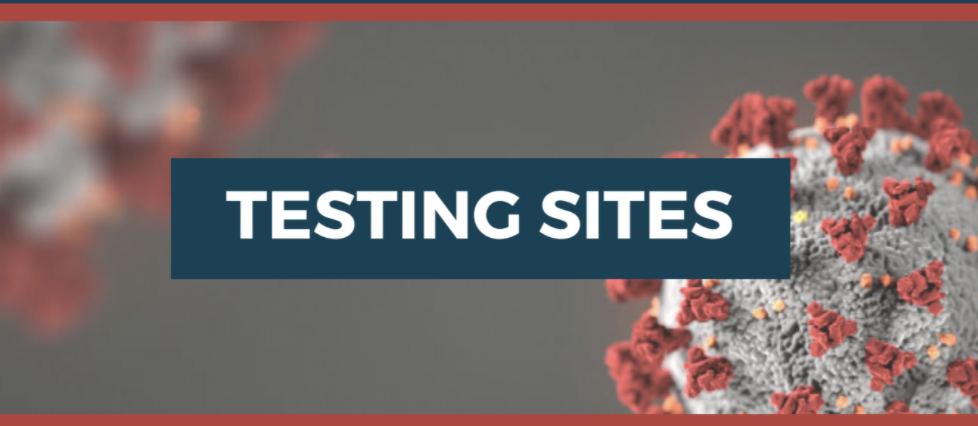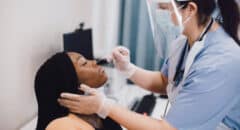
Officials across the U.S. are warning about a worrisome new fraud involving fake drive-through coronavirus testing sites in several states.
The FBI is investigating fake test sites in Louisville, Kentucky. And in Birmingham, Alabama, U.S. Attorney Jay Town issued a warning about bogus, fly-by-night testing sites.
Other reports about such sites have emerged in Arizona, Florida, Georgia, New York and Washington state, government and nonprofit officials state.
In Kentucky, David James, president of the Metro Louisville Council, said he ran a group of alleged COVID-19 testing scammers out of town last week.
James, a retired police officer, had heard from constituents that groups of people dressed in an array of personal protective equipment were taking mouth swabs from people seeking COVID-19 tests.
"I thought that was kind of weird,” said James, 58, because he hadn't heard of a local hospital offering drive-through tests in church parking lots and at homeless shelters. So he traveled to one site on March 30 accompanied by a local consumer advocate.
James said there was a line of waiting cars. People seeking the tests were told to pay $240 in cash or give their Medicare or Medicaid cards and Social Security cards to verify their identity, and that if they were enrolled in the government health care plans, the plans would be billed.
"I explained to the crowd that they were being lied to,” he said. People who paid for tests told James that specimen collectors did not change their gloves between tests and could have been spreading the virus to others. “And that angered me."
James went to another site at a gas station and saw a sign on the street with two red crosses mimicking the American Red Cross logo. There staffers wearing personal protective equipment wore neck lanyards that misspelled the health care law known as HIPAA, which is the Health Insurance Portability and Accountability Act.
"Those raised my suspicions,” he said, noting that the testing groups had offered pop-up, drive-through services at different sites over four days.
He followed them to Interstate 65, where they headed north toward Chicago. One of their tents fell out of their pickup truck and knocked off his mirror, “but they didn't come back.”
Brown advised consumers to use only approved testing sites affiliated with trusted hospitals and providers. Be wary, he said, of people wearing painter's clothing and uniforms resembling those worn by workers collecting hazardous material — instead of legitimate personal protective equipment. He also warned of exorbitant upfront cash fees for tests and cautioned Medicare recipients to stay away from testing advertised as “free to Medicare beneficiaries.”
"Because it usually isn't,” he said.
Cynthia Lucas, vice president of anti-fraud initiatives for the Washington-based National Health Care Anti-Fraud Association, a nonprofit that represents private health insurers, government health plans and law enforcement agencies, said her members have reported testing-site fraud operations in Florida, Georgia and New York.
"Where there is fear, there are dollars to be made,” Lucas said. “Beware of testing sites that advertise on social media. Rely on reliable sources. Also, legitimate medical testing sites don't demand cash for tests and don't set up sites in gas station parking lots."
Thomas Brannon, the assistant special agent in charge of the Investigations Unit for the Health and Human Service Department's Inspector General's Office, said reports of COVID-19 testing site scams are coming from around the country, singling out Arizona, Florida and Washington.
"My speculation is this is going to be occurring everywhere now,” he said. “We advise that if the testing is not done at a hospital or clinic, be suspicious. But don't go to be tested at a pop-up tent outside of a gas station or Walmart parking lot. And don't give any personal information to anyone but your personal providers. All scammers need is your Medicare number and they can compromise your entire life.”
He said scammers could be taking those Medicare numbers and billing for additional tests and durable medical equipment in the thousands of dollars.
Officials are urging residents to seek testing at pharmacies, clinics, or state or local health departments.
“If you have any doubts about the testing location that you’re looking at, go ahead and ask some questions: What lab is the testing site using? When will you receive the results, and from whom?” Illinois State Health Director Dr. Ngozi Ezike said.
Illinois Gov. J.B. Pritzker said some of these testing sites are either leaving patients waiting for results for long periods of time, or aren’t returning results at all. Pritzker sent a letter to Illinois Attorney General Kwame Raoul on Monday, saying “illegitimate, fly-by-night testing operations” have cropped up, especially in the Chicago area. He said they have been unfairly charging people for tests, providing inaccurate results or failing to provide results.









